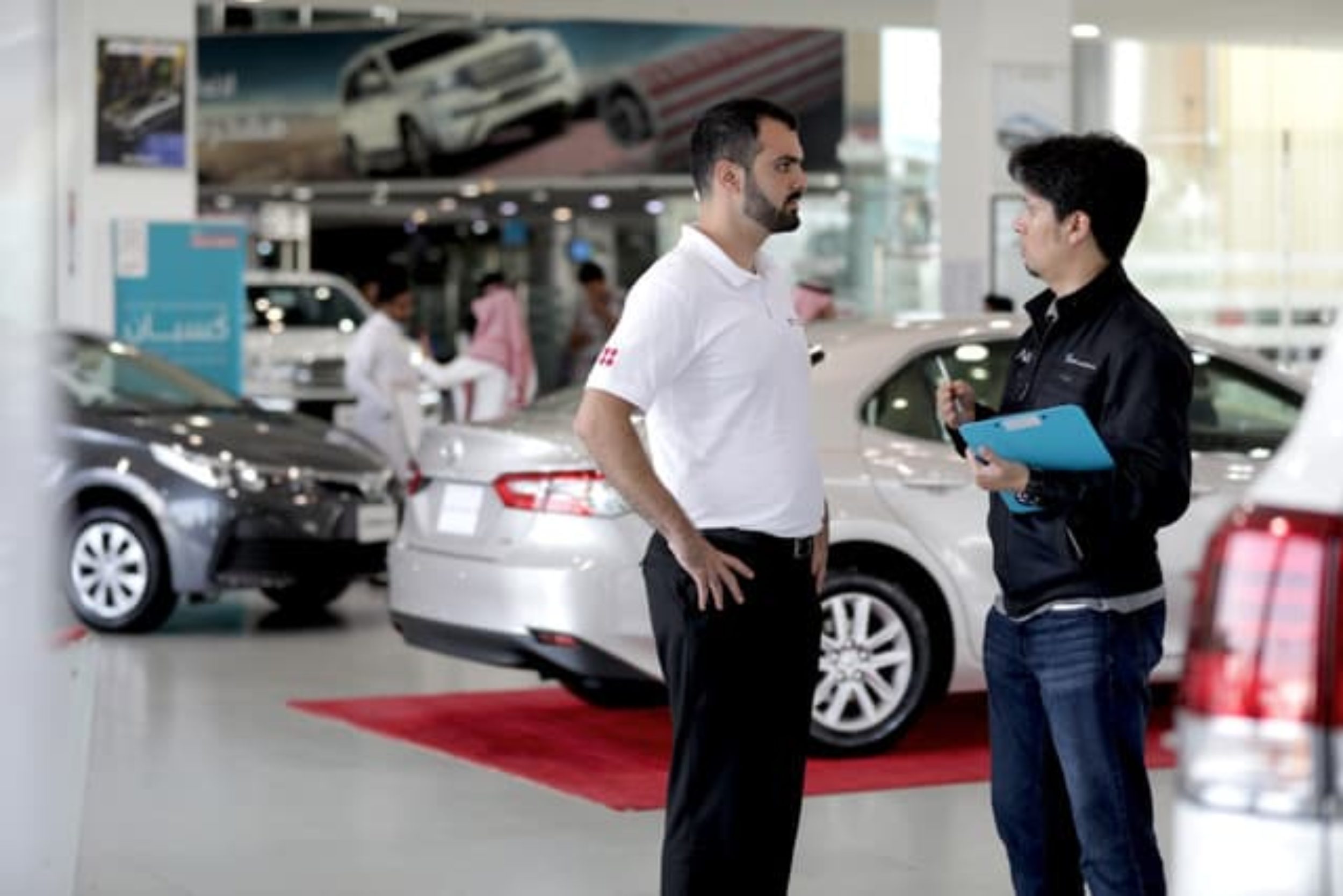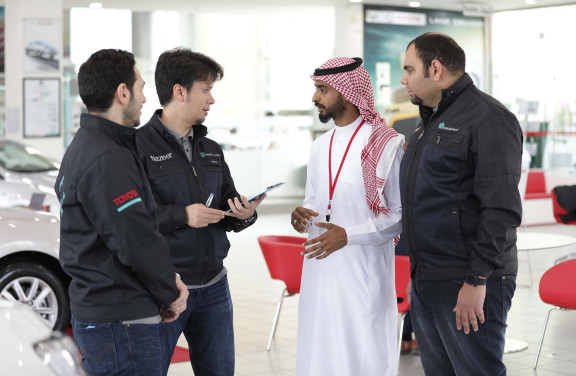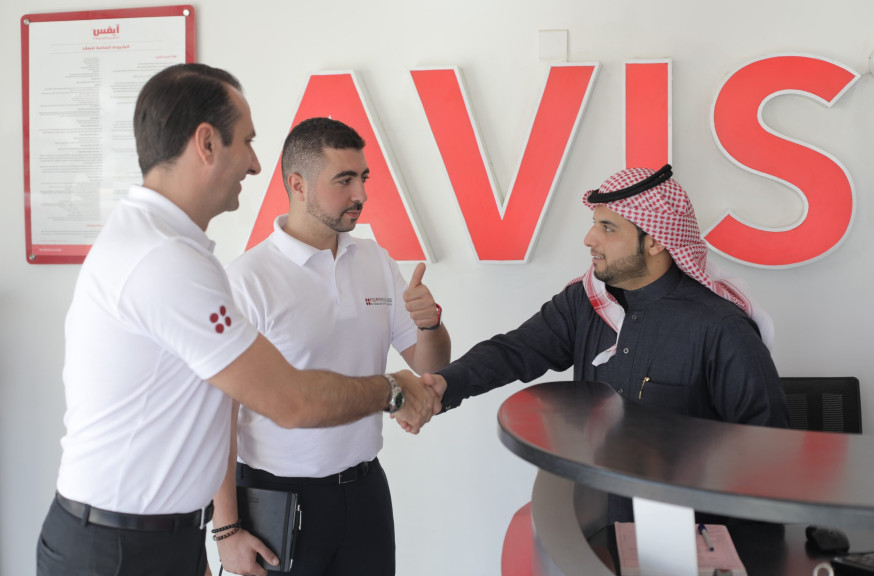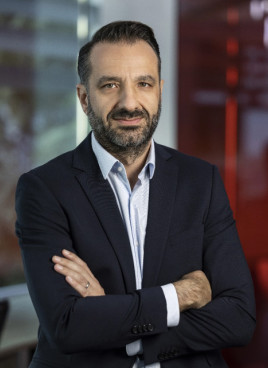Abdul Latif Jameel opened in 1945 its first Toyota car sales outlet with only 4 vehicles in Jeddah, Saudi Arabia. Sixty years later, Abdul Latif Jameel has transformed from a humble Saudi company into a global leader in the automotive industry and represents one of Toyota’s largest independent authorized distributors worldwide.
In 2016, the management of Abdul Latif Jameel decided to kick-off a large-scale transformation project with Four Principles across their 3SCenters in Saudi Arabia.
The aim was to turnaround the current processes, which were bureaucratic, cumbersome and confusing from a customer point of view, into a ‘best-in-class’ customer journey and customer experience at the 3S centers.
Through a series of cross-functional and cross-divisional workshops, facilitated by Four Principles, the management defined the vision that would serve as the basis to design the new processes and customer journeys:
- Evolve the customer relationship, from a guest to a friend: engage the customer at an emotional level, where the Abdul Latif Jameel associate becomes the trusted go-to person for the customer.
- Evolve from an individual to a team: by breaking the professional silos, achieving a collective mindset that strives towards success.
- Evolve from hunting to farming: enable continuous communication with the customer, celebrate & recognize the relationship and the customer loyalty.
- Creation of a recognized retail brand: the customer needs to identify that any Abdul Latif Jameel experience is unique, is known and is standardized across KSA.
- Embed a zero-defect mindset into all associates: by identifying the problems’ root causes and implementing solutions for them.
In order to understand how far was the current practice from the vision, Four Principles performed a VOC (voice of the customer) analysis by interviewing the customers of the selected pilot center, followed by a process current state analysis with the Abdul Latif Jameel associates. The major areas of improvement identified were:
- High silo mentality, due to misalignment of incentive schemes among Abdul Latif Jameel Motors and their sister company & provider of financing solutions Abdul Latif Jameel United Finance.
- Several customer touchpoints with different representatives of Abdul Latif Jameel, including duplication of process steps during the new vehicle sales journey.
- High number of documents requested by Abdul Latif Jameel from the customer during the sales process.
- Only 58% of the new vehicles were delivered within 10 days from the point of purchase until delivery to customer.
- Sales team productivity impacted negatively by a bureaucratic & lengthy sales process.
- Excessive vehicle turnaround lead-time from vehicle receiving until vehicle delivery to customer at service center.
- Workshop productivity affected by inefficient operational processes.
- Net promoter score for sales only at 65% and after-sales at 59%.
Following a bottom-up approach, the major root causes were identified with the team, and a series of solutions were developed to overcome the current situation based on the application of the Lean principles and the management vision. The solutions and future state processes design phase focused heavily in two major areas:
- New vehicle sales customer journey.
- Workshop vehicle servicing customer journey.
Within the new vehicle sales customer journey, some examples of the changes realized are:
- Implementation of a greeter and the introduction of the concierge principle in the showroom, whereby the salesman becomes the single touch point for the customer and a reference for him throughout the entire vehicle lifecycle.
- Digitization of the sales transactions and leasing approval processes.
- Implementation of a queueing system to ‘pull’ the salesmen, which benefits them by evenly distributing the workload.
- Implementation of daily KPIs follow-up to track the conversion ratio and performance of each salesman, allowing management to identify performance gaps or negative trends and their root causes, and to proactively define solutions for them.
- Reduction of the number of papers and touchpoints necessary through direct liaison with the Saudi Arabian Monetary Authority (SAMA).
These changes resulted into:
- 60% reduction of the number of visits that a customer had to do to purchase a new vehicle.
- 43% reduction of the total lead time to deliver a new vehicle to a customer.
- 41% increase in the number of vehicles delivered within less than 10 days.
- 25% increase in the overall net promoter score for sales.
- 65% increase of the average conversion ratio per salesman for new customers.
- Reduction of the bureaucratic mindset in the showroom and general improvement of the customer journey in the showroom.
Within the workshop vehicle servicing customer journey the changes focused on speeding up the key-to-key vehicle turnaround time as this was the major area of improvement highlighted by customers. The main changes implemented are:
- Implementation of the service advisor as the single point of contact in the vehicle servicing customer journey: during vehicle receiving, vehicle delivery and any other interaction in between.
- Implementation of the promised delivery lead time based on workshop planning and existing workload.
- Implementation of a job ‘pull’ system in the workshop that enabled better workload distribution and enhanced the technicians’ productivity and time-on-tools ratio.
- Implementation of daily follow-up of the main KPIs to track the main deviations between actual and expected performance, enabling quick root cause analysis and solutions implementation to close identified gaps.
These changes resulted into:
- 36% overall key-to-key lead time reduction for mechanical general jobs and 5% key-to-key lead time reduction for preventive maintenance jobs.
- 11% increase of workshop technicians’ productivity.
- 5% increase of the net promoter score.
- 35% increase of overall workshop capacity with the exact same resources.
The combined effect of the improvements in the pilot center convinced management to roll out the changes to the remaining 3S centers in the country, where the results have been replicated and in some cases further improved, depending on a mix of traffic, seasonality and overall market awareness.
As Mr. Taha Al Ghamdi, Managing Director of Abdul Latif Jameel Retail says, ‘the changes made all impacted positively the bottom line of the company and the operating profit of the centers where the methods were deployed.’










